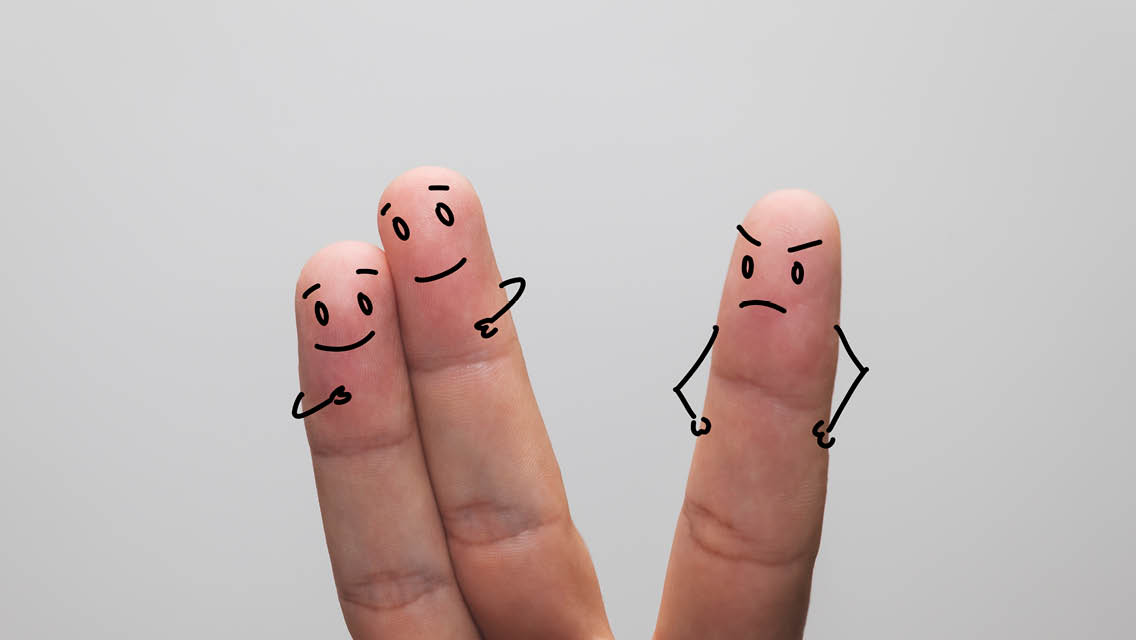The college students were stressed. It was the No. 1 feeling they reported in a 2017 survey conducted by the Yale Center for Emotional Intelligence. Psychoanalyst Robin Stern, PhD, the center’s associate director, had expected as much. What surprised her, though, was the reason why.
“When we unpacked it, we found that the feeling behind all this stress was envy,” Stern recalls. “These students were envying their peers’ summer internships, their dating lives, their family resources. These are people whose dreams came true — they got into Yale — and you’d think they’d feel happy. But their happiness was overshadowed by envy; they wanted what their friends had.”
Envy is a tricky feeling. As Stern’s research illustrates, it doesn’t always show its face clearly — in fact, we’re often not even aware of our envious feelings. Sometimes it masquerades as stress. Sometimes it looks more like sadness, anger, or resentment.
“Envy is an unconscious defense mechanism against a threat to our own self-esteem,” says University of Texas, Austin psychology professor Kristin Neff, PhD, coauthor of The Mindful Self-Compassion Workbook. “It’s a feeling our ego creates to protect itself. And because it’s unconscious, it can be difficult to notice what’s going on.”
To further complicate matters, envy and jealousy are two distinct emotions that we frequently mistake for one another, Stern explains.
Jealousy typically involves a fear that someone will take something from us, while envy — as in the case of the Yale students — means coveting something that belongs to someone else. But the terms are frequently conflated or used interchangeably, making it even more challenging to identify the real emotion.
Left unchecked, envy can be a destructive force. “If something great has happened for someone you know, you can take a step closer to them by engaging in positive empathy,” Stern advises. “And being there in those moments can be a powerful bonding experience. But when you steep in envy, you lose the ability to just be joyful for someone else.”
And yet, like all emotions, envy can also be a good teacher — if we can allow ourselves to learn from it.
Four Steps Toward Constructive Envy
1. Name the feeling.
“We have an expression at the Yale Center: ‘Name it to tame it,’” Stern says. “If you can name what you’re feeling, then you can do something about it.”
It seems simple, but clearly labeling the emotion is vital for determining your next steps. This may be especially true with envy, which so often comes in disguise.
Consider the case of the Yale students, who initially reported feeling stress. “If you go to your counselor or therapist and talk about being stressed, he or she might suggest you try meditation, breathing exercises, or other ways of calming the body,” Stern notes. “Those are wonderful practices, but they don’t address the underlying feeling of envy.”
Once you’ve named the emotion, Neff suggests you meet that feeling with compassion by recognizing that it’s perfectly natural. “I think a lot of people shame themselves for feeling envy,” she says, “but the person you’re envying probably has envy, too. It’s part of being human — we’re all just trying to feel worthy and loved.”
2. Dig a little deeper.
Mental-health counselor Vladimire Calixte, CRC, LMHC, author of Naked and Transparent: Six Vital Tools for Knowing Yourself and Attracting Healthy Relationships, suggests investigating envy by becoming a “student of the self.”
“Envy is a symptom of self-abandonment,” Calixte explains. “We often point the feeling outward, toward the person we feel envious of, but it’s really an internal issue. It’s our ego telling us we don’t measure up.”
Instead of stewing in that feeling, Calixte recommends examining it with some questions: What’s making me feel this way, and why? Am I content in my own life? Am I at peace with my choices?
“Be an ‘emotion scientist,’” Stern advises. “Rather than judging the feeling or assuming they already know where it’s coming from, emotion scientists are learners. They’re curious and open to discovering something new about themselves.”
Of course, the solutions to unenviable circumstances aren’t always entirely within our grasp. But getting to the root of those envious feelings can keep us honest about their source, so we don’t internalize negativity about ourselves or the people around us.
“It’s powerful to turn inward and question your envy because you’re not judging anyone else’s life — you’re just focused on yourself,” says Calixte. “Then you’re able to sift through those emotions, and you can also recognize yourself more clearly: what makes you good, wonderful, and worthy.”
3. Let go of comparison.
Comparison is at the heart of most envious feelings, and it can be a tough habit to break. The opportunities are everywhere, particularly in our digital lives, in which a stream of carefully curated photographs can easily leave us feeling inferior.
But it can help to remember that you’re essentially viewing a highlight reel of someone’s most shareable moments. “On social media, people create personas,” Stern explains. “If you’re on Instagram and not feeling good about yourself, it’s likely because you’re comparing your insides to someone’s outsides.”
Calixte says this is another opportunity for self-reflection. “What do you know about this person’s internal life?” she asks. “A lot of people are public successes but private failures. If you take a step back, you’ll probably realize you’re envying someone whose emotional life you don’t know much about.”
You can reduce some comparison temptation by showing up more intentionally in your digital life. Stern worked on a study with teens who tracked their emotions while engaging with social media, and she found they felt best when they used their platforms to consciously connect with their friends. “But when they were just mindlessly scrolling, they were far less happy,” she says. “They were feeling so envious, and that was driving their need to scroll.”
Whether online or in real life, social comparison isn’t healthy for us or our relationships. “You’re either feeling bad about yourself, or you’re feeling good about yourself at someone else’s expense,” Neff says. “But your worthiness doesn’t come from being better than anyone. It just comes from being you.”
Stern adds that you can reduce the temptation to compare yourself with others by remembering that there’s enough good to go around. “It’s that scarcity mentality that’s so crippling,” she explains, “rather than the abundance mentality that says: They have a great life, and that’s wonderful for them — and it’s possible for me, too.”
4. Practice self-compassion.
Neff suggests meeting envious feelings with self-compassion practices, such as talking to yourself the way you would talk to a friend, to inspire a sense of warmth and support.
“Self-compassion reduces the sense of the separate self,” she explains. “It’s acknowledging that you’re imperfect the way all humans are imperfect, and all of us struggle and falter. It takes the ego out of the picture, which is one reason it’s so helpful.”
Viewed through that lens, it’s easy to see how self-compassion can reduce social comparison — because it invokes our common humanity. Stern adds that you can tamp down envy by engaging in positive self-talk, like counting your blessings at the end of the day, or delighting in the tasks you’ve accomplished rather than ruminating on those remaining to do.
“We know that negative self-talk is very damaging to your self-esteem,” she explains. “But once you realize you’re doing it, you have some agency. You can deliberately craft positive sentences that you can say to yourself when you’re feeling critical about something you did or didn’t do.”
Self-compassion can also serve as a comforting reminder that occasionally feeling envious is normal, which means there’s no reason to compound the emotion with further guilt or shame. It can even be empowering, because it puts the remedy back in your own hands.
“Remember when you are feeling envy that it really comes from this desire to be loved,” Neff concludes. “And you can give that to yourself directly. You don’t have to achieve anything; you can just treat yourself with kindness.”
This article originally appeared as “Lessons From Envy” in the April 2021 issue of Experience Life.





This Post Has 0 Comments